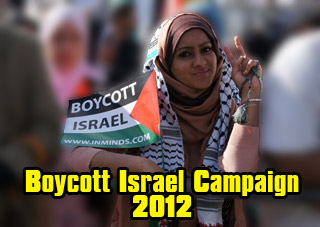
 Innovative Minds © 2014. All Rights Reserved. www.inminds.co.uk | ||||
Saudis continue to boycott IsraelMichael Freund, The Jerusalem Post
Washington conditioned Saudi Arabia's entry into the World Trade Organization (WTO) on it abandoning the boycott of israeli goods
Despite a promise made to Washington nearly 18 months ago to drop its trade embargo against Israel, Saudi Arabia continues to enforce the Arab League boycott, The Jerusalem Post has learned. In November 2005, Riyadh pledged to abandon the boycott after Washington conditioned Saudi Arabia's entry into the World Trade Organization (WTO) on such a move. A month later, on December 11, Saudi Arabia was granted WTO membership. The WTO, which aims to promote free trade, prohibits members from engaging in discriminatory practices such as boycotts or embargoes. Nonetheless, the Post has found, Saudi officials continue to bar entry to products manufactured in Israel or to foreign-made goods containing Israeli components. "Goods made in Israel are not allowed here in Saudi Arabia," Khaled A-Sharif, assistant manager of the Saudi Customs Department at King Abdul Aziz Airport outside Jidda, told the Post by phone. "Of course it is not permitted," he said. In the past, A-Sharif added, products made by firms that had "a relation" with Israel were also prohibited, but these were now allowed to be brought into the country. A Saudi customs official at the airport, who identified himself only as Feisal, told the Post, "If it is made in Israel, then it is not allowed here in Saudi Arabia. If it is made in any other country, then no problem. But not from Israel." A Saudi customs official at King Fahd International Airport in Dammam, who declined to give his name, told the Post Israeli-made goods would be confiscated upon arrival and not permitted entry into the kingdom. "You know, it is not allowed here," he said. US officials have said they continue to raise the boycott issue with their Saudi counterparts. In a written response appearing in last month's Congressional Record, US Trade Representative Susan Schwab addressed the question of Saudi compliance after being queried on the matter by Sen. Gordon Smith. In her reply to Smith, Schwab confirmed that continued Saudi enforcement of the anti-Israel boycott would "not be in keeping" with Riyadh's commitments under the WTO. Since the Saudis acceded to the WTO, Schwab wrote, "there have been conflicting signals from Saudi officials" regarding the boycott. "We have taken every available opportunity to raise this issue with Saudi authorities to remind them of their commitment and our expectation that they honor this commitment," she said. "The administration will continue to monitor the situation." As the Post revealed last year, the Saudis played host in March 2006 to a major international conference aimed at intensifying the anti-Israel boycott, and an official Saudi delegation took part in a meeting of the Arab League's boycott office in Damascus last May. Source: http://www.jpost.com/servlet/Satellite?cid=1176152801901&pagename=JPost%2FJPArticle%2FShowFull Congressmen blast Saudis for continued boycottMichael Freund, The Jerusalem Post Three powerful US congressmen have sharply criticized Saudi Arabia following a report in Monday's Jerusalem Post that the desert kingdom is breaking its pledge to drop the Arab League boycott of Israel. In November 2005, Saudi leaders promised Washington they would abandon the embargo on Israel after the Bush administration conditioned admission to the World Trade Organization on the move. A month later, Saudi Arabia was granted WTO membership. The WTO, which promotes free trade, prohibits member states from engaging in discriminatory practices such as boycotts or embargoes. Nonetheless, as first revealed in the Post, Saudi customs officials continue to block entry of goods manufactured in Israel and of items containing Israeli components. "Saudi Arabia's boycott of Israel never should have existed in the first place and they should end it immediately," Indiana Rep. Mike Pence, ranking Republican on the Middle East Subcommittee of the US House of Representatives' Committee on Foreign Relations, told the Post. "It is a relic of wars waged decades ago and there is simply no moral or strategic reason there should be a boycott at all." Pence also suggested that the continuing boycott could impact the US-Saudi relationship. "The Saudis clearly need to do a better job of living up to their commitments if they expect to have warm relations with the United States," he said. Rep. Howard Berman of California, a Democrat on the House Middle East Subcommittee, was also highly critical of Riyadh, saying the Saudi government was not living up to its word. "I strongly support efforts to end the trade boycott, which is clearly in violation of agreements the Saudis made during the WTO accession process," Berman told the Post. "The Saudis made a commitment to end the boycott to then-United States trade representative Robert Portman, and I expect Saudi Arabia to live up to that promise." Rep. Joseph Crowley of New York, a Democrat who sits on the Subcommittee on Trade of the House Ways and Means Committee, said the Saudis "must immediately end the boycott." "I continue to be disappointed in both the Saudi position and the Bush administration's reluctance to push a supposedly close ally of the United States on this," he said. "I will continue to talk with the US trade representative to make sure that our government is putting as much pressure on the Saudis to move forward and end the boycott." "The Bush administration," Crowley said, "has done nowhere near enough in convincing the Saudi government to end its participation in an illegal boycott aimed at hurting our No. 1 ally in the Middle East." "I hope that Congress will act to ensure that the boycott on Israel is ended for once and all," he said. An official from the US Trade Representative's Office said, "At the time of its accession to the WTO, Saudi Arabia did not invoke the nonapplication provisions of the WTO Agreement with respect to any member, and therefore has taken on all WTO rights and obligations, including most-favored-nation treatment, with respect to all members, including Israel." "In our view," the official said, "continuing the primary boycott of Israel would not be consistent with these commitments." While acknowledging that "there have been conflicting signals from Saudi officials on their understanding of their MFN [most-favored-nation] commitment," the official said Washington was pressing Riyadh on the issue. "The United States government takes every available opportunity to vigorously raise the boycott with Saudi authorities to remind them of their commitment and our expectation that they honor this commitment" said the official. Source: http://www.jpost.com/servlet/Satellite?cid=1176152837982&pagename=JPost%2FJPArticle%2FShowFull Also Of InterestPage URL: http://www.inminds.co.uk/article.php?id=10014
|
|
Support Us
If you agree with our work then please support us.Campaigns INMINDS Facebook Live Feed Latest Video's
INMINDS Twitter Feed Tweets by @InmindsComFeatured Video's
You need Flash player 8+ and JavaScript enabled to view this video.
[all videos (over 200)..] Featured MP3 Podcast  "For most journalists, whether they realize it or not, are groomed to be tribunes of an ideology that regards itself as non-ideological, that presents itself as the natural center, the very fulcrum of modern life. This may very well be the most powerful and dangerous ideology we have ever known because it is open-ended. This is liberalism." Campaigning Journalist and Film-maker Socialism 2007 Conference, Chicago [43min / 21Mb] [all podcasts..] Newsletter Feedback |
 |
 |












































